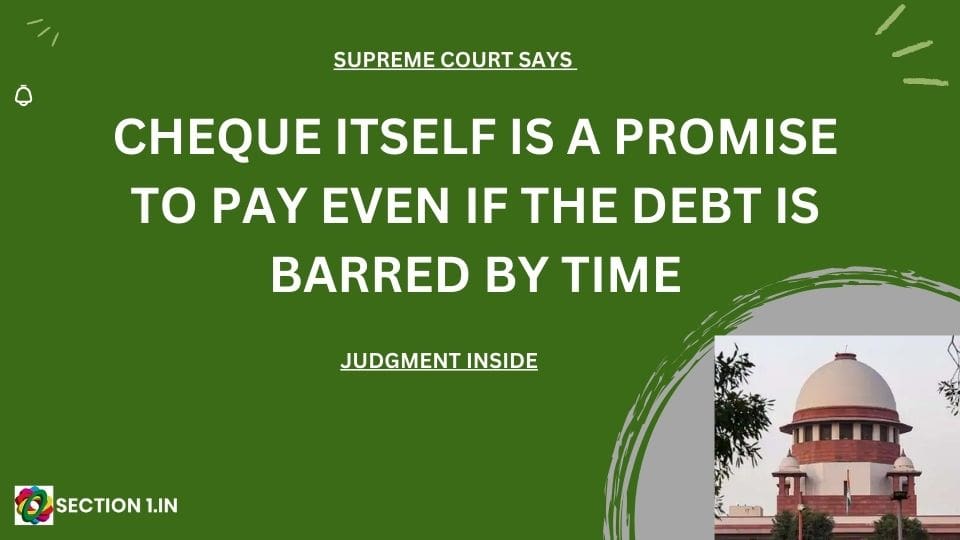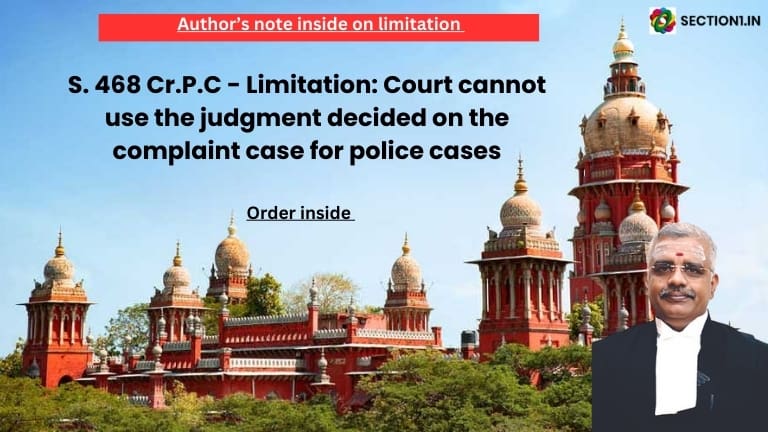CHEQUE ITSELF IS A PROMISE TO PAY EVEN IF THE DEBT IS BARRED BY TIME
10. From a perusal of the legal position enunciated, it is crystal clear that this Court keeping in perspective the nature of the proceedings arising under the NI Act and also keeping in view that the cheque itself is a promise to pay even if the debt is barred by time has in that circumstance kept in view the provision contained in Section 25(3) of the Contract Act and has indicated that if the question as to whether the debt or liability being barred by limitation was an issue to be considered in such proceedings, the same is Page 10 to be decided based on the evidence to be adduced by the parties since the question of limitation is a mixed question of law and fact. It is only in cases wherein an amount which is out and out non-recoverable, towards which a cheque is issued, dishonoured and for recovery of which a criminal action is initiated, the question of threshold jurisdiction will arise. In such cases, the Court exercising jurisdiction under Section 482 CrPC will be justified in interfering but not otherwise. In that light, this Court was of the view that entertaining a petition under Section 482 CrPC to quash the proceedings at the stage earlier to the evidence would not be justified.
xxx
12. Having referred to the judgments cited, prima facie we are of the opinion that the decision in S. Natarajan and A.V. Murthy (supra) has taken into consideration all aspects. No other elaboration is required even if the observations contained in the case of Expeditious Trial of Cases under Section 138 of NI Act (supra) is taken note, since, whether the debt in question is a legally enforceable debt or other liability would arise on the facts and circumstance of each case and in that light the question as to whether the power under Section 482 CrPC is to be exercised or not will also arise in the facts of such case. Even otherwise we do not see the need to tread that path to undertake an academic exercise on that aspect of the matter, since from the very facts involved in the case on hand ex facie it indicates that the claim which was made in the complaint before the Trial Court based on the cheque which was dishonoured cannot be construed as time-barred and as such it cannot be classified as a debt which was not legally recoverable, the details of which we would advert to here below. In that view, we have chosen not to refer to the cases provided as a compilation as it would be unnecessary to refer to the same.
xxx
14. As already noted, the facts are almost similar in all four cases and as such for the purpose of narration a perusal of the promissory note dated 25.07.2012 (Annexure P/1) would inter alia record as follows:
“…..hereby admit to have availed a loan amount shown above for the purpose of meeting my own family expenses and for higher education of my children by collecting the cash amount of Rs.20,00,000/- (In words: Rupees Twenty Lakhs only) for which I do hereby further agree to pay a monthly interest of Rs.2/- (In words: Rupees Two only) per month and fully understand hereby that I am bound by virtue of the promissory to repay the capital or principal loan amount as well as the agreed payable monthly interest amount within the date of December 2016 by ensuring the total payment to you or any of your assignees as directed by you by taking the payable amount to your home and pay it there...” (emphasis supplied)
15. A perusal of the above-extracted and emphasised portion would indicate that the promise is to repay the principal amount with the interest accrued within December, 2016. Hence, when the respondent had agreed to repay the amount within December, 2016, the cause of action to initiate proceedings to recover the said amount if not paid within December 2016 would arise only in the month of December, 2016. In that light, the limitation would be as provided under Article 34 to the Schedule in the Limitation Act, 1963.
PROMISSORY NOTE LIMITATION WOULD BEGIN TO RUN FROM THREE YEARS OF FIXED TIME EXPIRES
16. The provision would indicate that in respect of a promissory note payable at a fixed time, the period of limitation being three years would begin to run when the fixed time expires. Therefore, in the instant case, the time would begin to run from the month of December, 2016 and the period of limitation would expire at the end of three years thereto i.e. during December, 2019. In that light, the cheque issued for Rs.10,00,000/- which is the subject matter herein is dated 28.04.2017 which is well within the period of limitation. The complaint in CC No.681 of 2017 was filed in the Court of the Chief Metropolitan Magistrate on 11.07.2017. So is the case in the analogous complaints. Therefore, in the instant case not only the amount was a legally recoverable debt which is evident on the face of it, the complaint was also filed within time. Hence there was no occasion whatsoever in the instant case to exercise the power under Section 482 to quash the complaint. In that view, the order impugned dated 12.02.2019 passed by the High Court in Criminal Petition Nos.12652, 12670, 12675, and 12676 of 2018 is not sustainable.
PARTY: K. Hymavathi vs. The State of Andhra Pradesh & Anr – CRIMINAL APPEAL NO. OF 2023 (Arising out of SLP (Crl) No. 7455 of 2019) – September 06, 2023.
https://main.sci.gov.in/supremecourt/2019/21475/21475_2019_7_1502_46755_Judgement_06-Sep-2023.pdf




